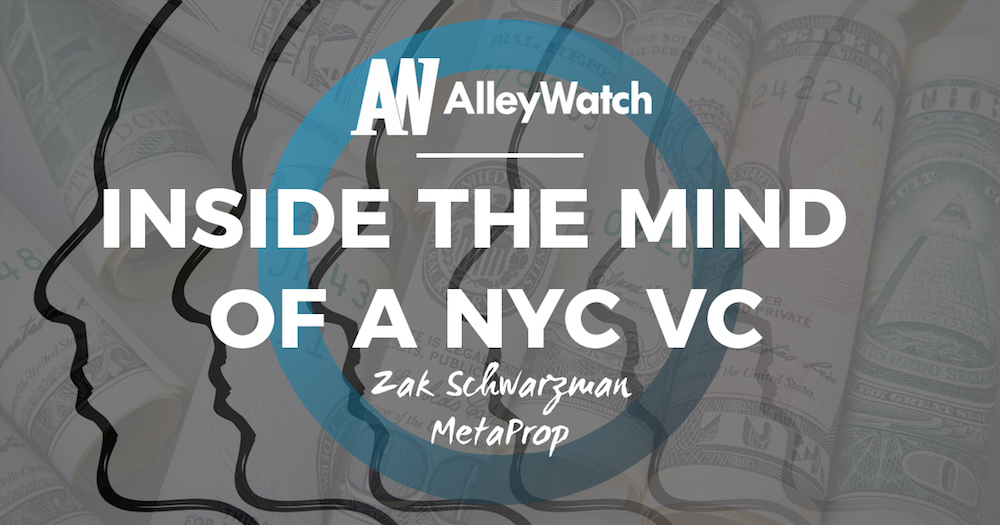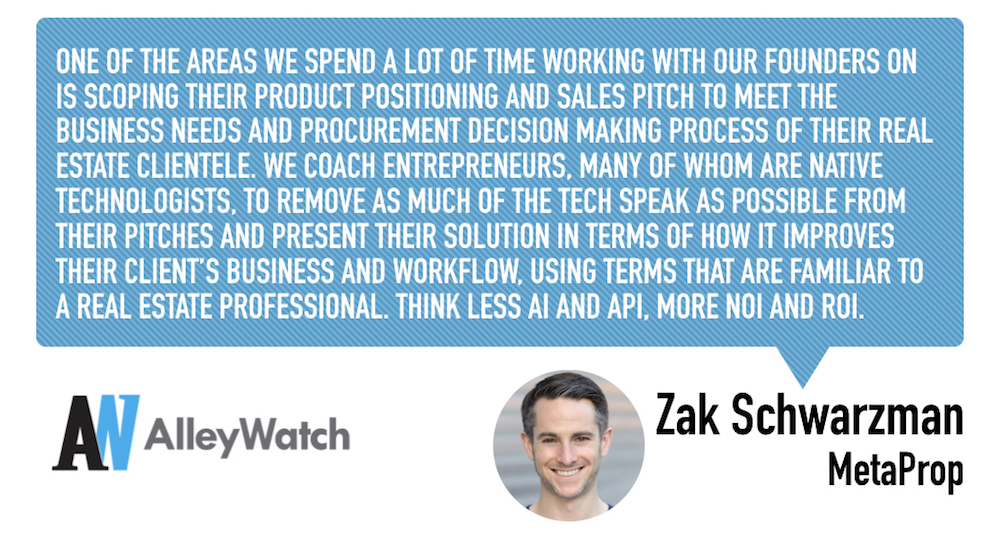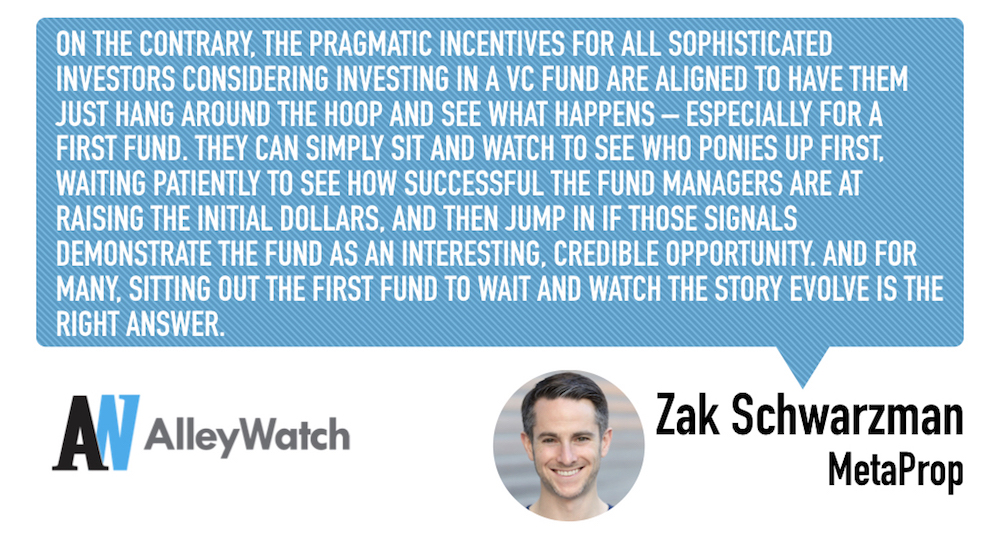Welcome back to Inside the Mind of an NYC VC, a highly acclaimed series at AlleyWatch in which we speak with New York City-based Venture Capitalists. In the hot seat this time is Zak Schwarzman, Partner at MetaProp, the visionary investment firm that has been instrumental in making PropTech a viable investment vertical. MetaProp currently invests out its second fund, which just closed oversubscribed at $40M recently. The firm has made investments in a range of companies that provide solutions across the real estate spectrum including Enertiv (building maintenance through data), Bowery (appraisal), Jetty (insurance), LoftSmart (student lease rentals), and Notion (security and monitoring).
Zak was kind enough to join us to discuss his story of how he got into venture, MetaProp’s newest fund and how it differs from the inaugural fund, how MetaProp has been able to successfully bridge the traditional real estate industry with innovation, actionable tips for entrepreneurs looking to raise in the PropTech space, and much, much more.
Zak Schwarzman, MetaProp
AlleyWatch: Please tell us a little bit about your background and how you started in venture.
Zak Schwarzman, MetaProp: My path to venture has been a very happy accident.
I’d spent the early part of my career in economic and international development. Through that work, I became involved in the world of microfinance and social entrepreneurship and was motivated to go back to business school as a launching pad to start a company in that space.
When I got to Columbia, I sought out a venture capital internship during my first semester. I thought it would be a good way to quickly get exposure to a high volume of startups and understand how the capital markets evaluate them early in their lives. I quickly became fascinated by the space and re-oriented my professional path in that direction. I wound up working for several firms, from sector-specific to corporate to early stage, to mid-stage throughout business school. That experience enabled me to see a broad range of investment strategies and styles and meet a number of future mentors along the way. Following business school, I rejoined a firm, Gotham Ventures, that I had interned with while getting my MBA.
At the same time, my former classmate at CBS and now a partner at MetaProp, Zach Aarons was quickly becoming the most active angel investor in the PropTech space. He became a trusted resource to consult whenever I was looking at a PropTech deal. So I had an inside view as he, Aaron Block, and Clelia Peters began to grow MetaProp from an accelerator into a nascent investment platform. As both MetaProp and the broader PropTech space began to take off, we workshopped the strategy for how to grow MetaProp’s investment practice to take advantage of this fabulous platform that they were building and really be a differentiated leader in this emerging category. Eventually, that dialogue led to my joining the partnership to lead the growth of our investing practice. Those conversations are very much the groundwork for Fund II, which we announced last week.
We recently announced our second PropTech-focused venture capital fund. MetaProp Fund II, which totals $40M, was fully oversubscribed and 50% above our initial target, which is obviously very rewarding.
We are thrilled to be joined in this journey by a simply fabulous cross section of blue-chip investors from across the global real estate landscape, including RXR Realty, PGIM Real Estate, Cushman & Wakefield, CBRE, and JLL Spark. Taken together, Fund II’s investor base represents the largest consortium of early adopters in real estate, and a combined pilot- and test-ready sandbox of more than 15 billion sq. ft. More than marking an affirmation of MetaProp’s mission to identify and support the next generation of elite PropTech startups, their partnership will be an industry-best asset in helping us fulfill it.
Fund II is really a continuation of the work we’ve been doing for the past several years – investing in and growing the next generation of iconic PropTech companies. The biggest difference is that previously, we used to invest a modest amount directly and assemble a powerful complementary syndicate of strategic and financial investors to come in alongside us. Now, we write larger checks that come with the industry’s largest syndicate of strategic real estate investors already baked in via our LP base.
While we announced it last week, we have already made the first 10 Fund II portfolio investments. Early Fund II portfolio names include – Workframe, WhyHotel, Irene, Locate.ai, Jones, Travtus, Doorport, Hoozip, and OnSiteIQ. Reflective of our investment scope, these investments represent a broad cross-section of the PropTech market–from frontier areas like AI-powered property management or retail site selection, to the improvement of friction-filled real estate processes like office construction management, to new models to better utilize and monetize space. We expect to add roughly 25 additional names to the Fund II portfolio and are inspired but the diversity, sophistication, and ambition that we see amongst the next generation of PropTech startups.
What can entrepreneurs expect with this new fund?
As we continue to deploy Fund II, entrepreneurs can expect:
- Early-stage focus: With our second fund, MetaProp continues and expands on our firm’s successful history by focusing exclusively on early-stage (generally pre-seed through Series A) PropTech startups. Our unique position in the market enables us to identify emerging PropTech opportunities and invest with conviction early in a company’s maturity.
- Full PropTech investment scope: We invest in next-generation innovations using software, hardware, and technology-enabled services to improve and/or rethink every aspect of the global real estate market. This includes companies that impact every asset type within real estate and every function or task that a real estate professional performs during the lifecycle of a real estate asset, from dirt to disposition.
- Access to customers: All told, Fund II’s LP base offers PropTech startups a pilot- and test-ready “sandbox” that spans more than 15-billion-square-feet across every asset type and global market. Combined with our additional reach through the RE200 Mentor Network, and MetaProp’s advisory, events, and media platform, MetaProp provides unparalleled access and exposure for our early stage PropTech portfolio companies.
- Access to capital: Our team has closed more than 90 PropTech investments with a broad coalition of strategic and venture investors from around the world. Our peers in the investment community know us as a partner who can help with market de-risking pre-investment, and early distribution, product refinement, and top real estate talent post-investment. It’s a value prop that has resonated strongly with founders and investors to date and one that we are proud to carry forward into Fund II.
What percentage of the fund is reserved for follow-on investment?
The bulk of Fund II’s capital is reserved for follow-on investments.
Our unique position in the market enables us to identify emerging PropTech opportunities and invest with conviction early in a company’s maturity. Yet we are capitalized to serve as a long-term capital partner to our portfolio companies and typically continue to invest through several additional rounds.
Beyond even our direct capacity, our LP base represents a consortium of the most coveted strategic investors in real estate who can, when appropriate, provide additional capital to deepen their involvement with a portfolio company.
How is venture different now than it was when you first started?
One of the most notable changes in venture over the past several years has been the move towards firm specialization. This is particularly true at the seed stage, where so much of the job is about discovery, vetting and then helping a company go from 0 to 1.
You could see that start to emerge around 2009-2012 when a new breed of firms dedicated to seed-stage investing came on the scene that were distinct from the traditional early-stage venture crowd in both design and positioning.
Since then, you’ve seen more and more firms emerge that are not just stage-specific but have a specific vertical or theme focuses. Their firm designs and positioning are similarly reflective of their focus.
Overall, I think this degree of specialization provides these firms with a real advantage within their domains. When done well, it is a huge boon to startups – particularly those operating in traditionally thorny categories like PropTech – who can more easily seek out investors who have deep knowledge within their domains and whose value-add services are specifically scoped to their category.
You’ve worked at a number of venture firms now. What distinguishes MetaProp and what is it like to be working at a fund that with such a specific focus?
Since inception, MetaProp has been dedicated to one thing: providing talented PropTech founders with the knowledge, network, and resources that they need to grow their businesses and meaningfully impact the real estate industry.
Building a venture platform and broader firm around such a tight organizing principle has been a real treat. It has enabled us to be very intentional about how we design our machine. Our team, network, market view, diligence process, post-investment portfolio resources, accelerator and advisors platform, etc. are all built with this purpose in mind.
It’s a real privilege, particularly in one of the most exciting spaces (PropTech) within the venture market, to be able to approach any deal with an information advantage and knowing that your firm represents highly differentiated, needle-moving value for the founders.
What are you excited about in the real estate and PropTech space that has the potential to cause severe disruption?
When it comes to investment focus, we have two constraints: all PropTech, all early-stage. Within those constraints, we invest as broadly as possible. In a space that is moving as quickly as PropTech and in an industry as broad as real estate, we want to be in a position to back the next great innovation within the category, wherever it springs up.
A couple of areas where we are eager to do even more include:
- The transformation of Architecture, Engineering, and Construction. This includes areas like autonomous construction equipment, job site imaging and analytics, modular housing, 3D printing of buildings, etc.
- Residential disruption within the transaction, brokerage and financing layers of the purchase process. There is still so, so much friction here.
- All of the myriad intersections of real estate and the capital markets.
- The future of retail.
- New models and platforms that activate fallow or underutilized space.
- Any task within real estate whose workflows are still defined by the holy trinity of inefficiency: paper, pen and Excel.
What do you need to see from teams, both qualitatively and quantitatively, in order to invest?
The biggest thing that I look for is founders who can clearly articulate what secular change (e.g. new tech capabilities, shift in customer expectations, or partner landscape, etc.) has occurred in their market that presents a new opportunity that they are uniquely suited to tackle. Founders who can clearly answer that question in a way that demonstrates mastery of their domain are at a huge credibility advantage.
Beyond credibility and domain command, we place an emphasis on core teams with at least one technical founder and track records of milestone achievement.
What metrics do entrepreneurs overlook or not place enough emphasis on that are important to consider when you are evaluating investment merit of a business? What metrics are very specific to real estate and PropTech businesses that are important?
Sale dynamics are definitely an area we focus on. Many of our companies—particularly those whose technology is applicable at the asset-level – sell in stages. A customer relationship often starts as a single site pilot, before rolling out to a small-scale commercial implementation that may then roll out region-wide and then finally portfolio-wide if fully successful. Understanding the dynamics, costs and time that that goes into these processes is important for PropTech entrepreneurs.
Your LPS are comprised of a number of notable traditional real estate firms and the ability to test and pilot real estate tech solutions to these companies is noted as a value-add for startups. Can this dynamic potentially present a signaling issue if the RE firm chooses not to pilot a portfolio company’s solution? How do you manage these potential conflicts?
Whether it’s our LP base or our much broader relationship-base, our network is built for density rather than exclusivity. It’s part of the community-driven approach that has always been core to MetaProp. So if a particular company in MetaProp’s portfolio is not a commercial fit for a specific LP – which may be the case for any number of very valid reasons – that in no way limits our ability to facilitate commercial opportunities for that company, whether within or beyond our LP base.
What can entrepreneurs do to ensure that the funding process is smooth from first meeting to getting to a round close?
Maintaining an active dialogue throughout the process through timely, thoughtful communication is one of the best ways to facilitate a smooth process.
What can entrepreneurs do to ensure that the relationship between the firm and companies is fruitful post investment? What resources does Metaprop have in place to facilitate this?
Put us to work! Whether it’s early customer development, product refinement, real estate talent recruitment, sales strategy, etc. we are built to accelerate the growth trajectory of early-stage PropTech companies. The more we’re in sync with your company’s needs as they arise, the more effective a partner we can be.
What are some things that you repeatedly see early-stage companies and founders struggle with?
One of the areas we spend a lot of time working with our founders on is scoping their product positioning and sales pitch to meet the business needs and procurement decision making process of their real estate clientele. We coach entrepreneurs, many of whom are native technologists, to remove as much of the tech speak as possible from their pitches and present their solution in terms of how it improves their client’s business and workflow, using terms that are familiar to a real estate professional. Think less AI and API, more NOI and ROI. The less time between your company’s name and a clear articulation of your impact on your client’s bottom line, the higher the probability of engagement.
Quick Hits:
Who do you admire in the startup world and why?
Stu Ellman, Will Porteous and the RRE team are definitely on that list. They have built an impressive track record and durable position over the decades as one of New York’s leading early-stage investors.
In addition, Stu and Will make time year after year to teach a venture seminar at Columbia Business School, which is consistently ranked as one of the school’s best courses. Through that course and beyond, they’ve personally served as mentors to several of our partners here at MetaProp. That kind of dedication to community and bringing up the next generation is something I really respect and seek to emulate in my own career.
What’s the last book you read?
Into Africa: The Epic Adventures of Stanley & Livingstone. I’m a sucker for stories of exploration and discovery.
What’s the song on your playlist that you are listening to most often right now?
My wife and I just got back from an annual pilgrimage down to New Orleans so there’s definitely some brass in rotation right now.
What’s your favorite outdoor summer activity in NYC?
Biking through the outer boroughs.
Are there any teams that you are rooting for in the World Cup?
USMNT 2022!









